Tags
Related Posts
Share This
SWA Writes, Talks, Eats Words
The Student Writers Association (SWA) held its first meeting of the school year last week, and with it began another year of quirky innovations in the art of writing. The coming semesters promise another mixed bag of surprises from the group, which delights in denying conventions. As a member of SWA myself, I decided to step out of the objective view of a reporter and bring some of the spirit of the group to our interviews. I ask each of my colleagues to bring their favorite book with them. Our assignment? To flip through the pages and find a word or phrase that describes each member of SWA. What follows is an act of literary communion, wielding dangerous Sharpies and filled with ink-splotched abandon.
Melinda Freudenberger
“That crazy bastard may be the only sane one left.” —Catch-22
When I meet up with Melinda Freudenberger on the Quad, she is smoking a cigarette under a tree. I ask her what’s on the horizon for SWA this year. “We’re planning a lot of cool open mics,” she says, and recalls watching a video of a band performing in a cave. While there are no caves in the Santa Fe area, she says we can expect some unusual locations for open mics.
“We’re planning on streamlining Coffee Spoons,” Freudenberger says of SWA’s literary magazine. Coffee Spoons began last year as a monthly, online publication, culminating in the release of a limited, physical copy at the end of the spring semester. After struggling to receive submissions to the magazine, SWA has decided to work with students who attend their meetings to produce pieces for publication. Issues of Coffee Spoons will then be released at the end of each semester.
Freudenberger believes that the group’s past difficulty in receiving submissions can be linked to students’ insecurities. “I equate this with open mic anxiety,” she says. “I share the feeling of not having something to read at an open mic or not feeling comfortable having my work published. Publication is put on a pedestal and it doesn’t need to be like that.” Coffee Spoons serves as an entry-level publication for students, but that doesn’t mean that all work is accepted. Freudenberger credits her acceptance into SFUAD’s annual literary journal, Glyph, as giving her the confidence to submit to outside publications. “You can be rejected from Coffee Spoons,” Freudenberger says, “but it exists as proof that you can be published.”
SWA has not always been so innovative and fun. In fact, Freudenberger says, “It was pretty shitty. The first meeting I went to, the seniors just talked at us. They told us to bring work in and they’d workshop it, but nobody ever did.” Freudenberger recalls a lack of warmth. “There wasn’t as much encouragement to new students to read as there is now. It felt closed off.”
This lack of community served as the impetus for change. Creative Writing faculty member Dana Levin was instrumental in finding new recruits. She pulled Freudenberger aside one day, along with Amaya Hoke, Marina Woollven and Nik Thomas. Levin took them by surprise when she addressed them as SWA. “That’s when things started to change,” Freudenberger says. “We had to stop and consider whether or not we actually cared about it, and if we did, how could we make it better?”
The group was strengthened last year by then-seniors Brandon Brown and Bailey Schaumburg. They provided the warmth that was missing. Schaumburg took charge of organizing the open mics. Brown made a conscious effort to mentor the underclassmen, grooming them to take over after he graduated. “We were really excited about it,” Freudenberger says, “but also a little nervous.”
This is Freudenberger’s second year as a board member of SWA. The work is not without its stress. So much time gets put into organizing events that board members don’t always get to see the benefits of their work. But every once in a while, there is proof that the work is not in vain. Freudenberger recalls the Coffee Spoons release party last semester. “We had a paper on the wall that you could write on.” At the end of the night, one phrase caught her attention: “I had a really terrible day and I came here and I felt hopeful again.”
“It showed me that what we’re doing actually matters,” Freudenberger says. “Even if that person only came to the Coffee Spoons meeting, that was worth it for me.”
Sitting at a table on the Quad, Freudenberger thumbs through a copy of Jonathan Safran Foer’s Extremely Loud and Incredibly Close. “This is my favorite book in the whole world,” she tells me. “It’s what made me want to write.” I pull out my own book, the hefty graphic novel, From Hell, by Alan Moore and Eddie Campbell. We both skim through our texts and find words to describe the members of SWA. When the task is complete, I ask Freudenberger to tear off her own description of herself. She rips the phrase from her notebook.
“Now, eat it,” I say.
Freudenberger’s eyes sparkle, her mouth dropping not in surprise, but delight. “Are you serious?”
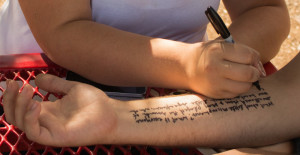
Melinda Freudenberger writes a quote from her favorite book on Andrew Koss’ arm. Photo by Christy Marshall
I nod my ascent and join her in consuming my description of myself. The folded scrap of paper, ripped from my reporter’s notebook, isn’t easy to chew. After swallowing the ink-infused lumps, we move on to the second part of our exercise. I ask Freudenberger to grab a Sharpie and write her description of me on my arm. She grabs my arm and begins writing a long quote from her book. Freudenberger’s delicate scrawl etches its way from my elbow to my wrist, in four, slightly illegible lines of ink. I write on Freudenberger’s wrist and try not to get any ink on her paper-crane tattoo. My choice for her is the quote, “No longer anchored by the roots of tradition.” I pick it because of Freudenberger’s penchant for experimental writing. “I love it,” she says. “It’s sick.”
The exercise is carried out again a few days later in Alexis Hall with three more members of SWA. We meet in the group’s new designated space at the back of the building. Creative Writing department Chairman Matt Donovan has partially furnished the room with a rug and a couple of red couches. There is more to come before the Writing Center officially opens on Sept. 21. The space is small, but it promises a more intimate atmosphere.
SWA members Melinda Freudenberger and Marina Woollven have already put together some unique artwork to hang on the walls, utilizing work produced by students at past SWA events. “As the semester goes on,” Amaya Hoke says, “we hope to accumulate different pieces or fragments on the walls which we can preserve for future years. We’re also going to have some paper up on the walls so people can write on it whenever they want.”
“But don’t start writing on the actual walls,” Hanson warns. “Wait for us to tell you.”
As I instruct my colleagues to pull out their favorite books, Hoke says, “This reminds me of something we would do in SWA.” Hanson and Charli Renken sit on the couch opposite from us, scribbling quotes in their notebooks. Hoke places her self-description into her mouth and swallows it faster than anyone else. She consumes the phrase, “It was really a stroke of luck that you were almost murdered by that girl.” The line comes from Joseph Heller’s Catch-22. Renken tries to speak, but her mouth is full of incomprehensible words.
Charli Renken
“Such a passion’s admirable in a fellow.” —From Hell
Charli Renken brings a copy of Felicia Day’s You’re Never Weird on the Internet (almost) to our interview. She does her best to answer questions before heading off to conduct a Jackalope interview of her own. Renken is one of two new members to SWA. One of her primary goals for the group is putting together a multimedia collaboration between the Creative Writing department and the Contemporary Music Program. “Possibly the Visual Arts department as well,” she says. “But I’m most excited about strengthening my craft and the writing community at SFUAD. I like helping and being a resource for people.”
Jen Hanson
“She could tell that I was zipping up the sleeping bag of myself.” —Extremely Loud and Incredibly Close
Jen Hanson joined SWA last year as one of the group’s board members, organizing writing seminars throughout the year. Hanson considers her work in SWA a test run for her future career. “In a nutshell,” she says, “I realized that, more than being a writer, I want to teach. I love mentoring.”
Early plans for this year’s seminars include one on setting led by Marina Woollven, while Amaya Hoke will likely reprise her popular character seminar. “Hopefully,” Hanson says, “the seminars will be bigger this year. I’ve created an application for people to submit their ideas. I’ll also be sitting down with them to help plan things out.”
Amaya Hoke
“Sometimes I imagine stitching all of our little touches together. How many hundreds of thousands of fingers brushing against each other does it take to make love?” —Extremely Loud and Incredibly Close
As conductor of the weekly SWA meetings, Amaya Hoke wants to work on expanding SWA’s reach outside the department. The group always welcomes participants from other majors. “We’re hoping the atmosphere of the new the room will draw more people in,” she says.
Hoke, like Freudenberger, lived through SWA’s difficult years. “After the first couple of meetings, it was scattered,” she says. “The meetings became like a myth, a supernatural creature that you never saw.” The lack of support from upperclassmen in the past inspired Hoke in her own efforts with SWA. “I’ve always believed that the underclassmen need people to look up to,” she says, after finishing her snack of loose-leaf paper and ink. “I want to be the person I needed when I was in their place. I want to be able to answer the questions that nobody answered for me.”
The first SWA meeting of the school year took place on Sept. 15, drawing nearly 20 freshman, sophomores, juniors and seniors. Two students came from outside majors and Creative Writing alumni Brandon Brown and Curtis Mueller showed up as well. The meeting proceeded with introductions, followed by a discussion of different genres of writing. Sophomore Brianna Neumann stated that she associates non-fiction with honesty. The comment was immediately rebutted by Marina Woollven, who stated that she feels non-fiction is inherently constructed of lies. On fiction, Melinda Freudenberger said she feels it is best when it makes you uncomfortable.
“Is fiction a lie?” Hoke asked the group.
Isaac Leigh offered up a beautiful metaphor. “Non-fiction is like walking into an abandoned house. Fiction is like building a house to move into.”
The discussion continued over the topics of poetry, screenwriting and various other incarnations of the craft. Hoke then segued into the writing exercise for the evening. She asked the group to write five or six sentences, choosing any one of the genres discussed. After five minutes of writing, the students continued writing where they left off, but wrote in a different genre. This was repeated once more and then students were given time to polish their transitions.
The result was sometimes jarring, and at other times brilliant. Bailey McGuire, a Performing Arts major, wrote a poetic piece worthy of any Creative Writing major. Judy Ripley started with poetry, then blended her piece with non-fiction and play writing. One student even utilized a comic book format at the end of her work.
Alumnus Curtis Mueller had the group in stitches with a piece that began with the non-fiction discovery of several clipped fingernails on the floor beneath his seat. The piece proceeded through poetry and ended with screenwriting. In Mueller’s script, he commands Freudenberger to eat one of the fingernails. After becoming sick, she goes to the doctor. In a Kafkaesque twist, she wakes up the next day to find she has been transformed into a fingernail. Outbursts of laughter erupted throughout the reading. Hoke hopes that the pieces created through these exercises will go on to be work shopped, until the writers end up with a solid final piece.
Andrew Koss
“What about little microphones? What if everyone swallowed them and they played like the sounds of our hearts through little speakers which we could put in the pouches of our overalls?” —Extremely Loud and Incredibly Close
My experimental interview techniques draw delighted responses from my fellow SWA board members. It feels good to bring something fresh to the table. I ask them if it was difficult to choose quotes that described their colleagues. “It was just the actual search through the pages that was hard,” Renken says.
I find the task similarly challenging. It takes time to find descriptive passages, but it’s even harder to find passages that apply to my friends. There are plenty of inappropriate juxtapositions as well. Locating a phrase that is complimentary is the most difficult task.
Hoke takes a different approach to the search. “I looked for things that triggered a feeling about the person. My quotes aren’t descriptive at all.” None of the members of SWA hesitate to let people write on their bodies. I inscribe a quotation onto Hanson’s wrist. She says it feels like a micro-massage. Hoke offers up not only her arms, but also her chest and face. “I’ll take off my glasses,” she says.
I’m not as adventurous as Hoke. I prefer the writing only on my arms. “I am a canvas,” I tell the small group in the SWA room.
“You are something better than that,” Hoke says. “You are a piece of notebook paper.”
I leave my friends, my arms covered in four distinct handwritings. The ink smears as I sweat my way through the day and leaves incomprehensible words on the sleeve of my t-shirt. I wouldn’t have it any other way. When I came to Santa Fe University of Art and Design I joined a group of people who inspire me, challenge me and constantly amuse me with their unique perspectives on making writing fun. This is the body and blood of SWA.
SWA will convene again in its new home in Alexis Hall on Sept. 29.






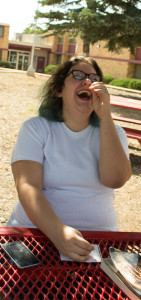
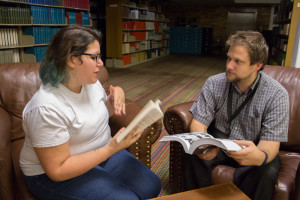
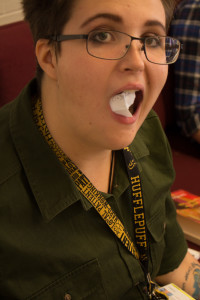
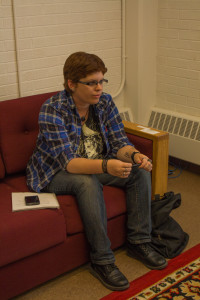
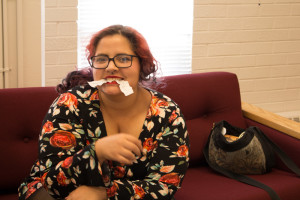
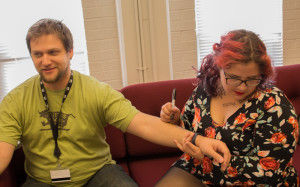
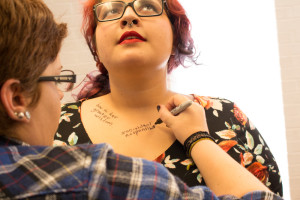
 Jackalope Magazine is the student magazine of Santa Fe University of Art and Design. Building on the interdisciplinary nature of our education, we aim to showcase the talent of our university and character of our city.
Jackalope Magazine is the student magazine of Santa Fe University of Art and Design. Building on the interdisciplinary nature of our education, we aim to showcase the talent of our university and character of our city.
Interesting way to eat your words
Thanks, Mom! 🙂